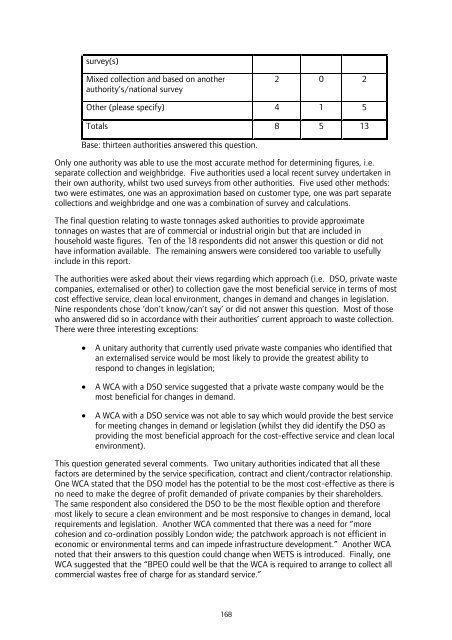London Wider Waste Strategy - London - Greater London Authority
London Wider Waste Strategy - London - Greater London Authority
London Wider Waste Strategy - London - Greater London Authority
Create successful ePaper yourself
Turn your PDF publications into a flip-book with our unique Google optimized e-Paper software.
survey(s)<br />
Mixed collection and based on another<br />
authority’s/national survey<br />
2 0 2<br />
Other (please specify) 4 1 5<br />
Totals 8 5 13<br />
Base: thirteen authorities answered this question.<br />
Only one authority was able to use the most accurate method for determining figures, i.e.<br />
separate collection and weighbridge. Five authorities used a local recent survey undertaken in<br />
their own authority, whilst two used surveys from other authorities. Five used other methods:<br />
two were estimates, one was an approximation based on customer type, one was part separate<br />
collections and weighbridge and one was a combination of survey and calculations.<br />
The final question relating to waste tonnages asked authorities to provide approximate<br />
tonnages on wastes that are of commercial or industrial origin but that are included in<br />
household waste figures. Ten of the 18 respondents did not answer this question or did not<br />
have information available. The remaining answers were considered too variable to usefully<br />
include in this report.<br />
The authorities were asked about their views regarding which approach (i.e. DSO, private waste<br />
companies, externalised or other) to collection gave the most beneficial service in terms of most<br />
cost effective service, clean local environment, changes in demand and changes in legislation.<br />
Nine respondents chose ‘don’t know/can’t say’ or did not answer this question. Most of those<br />
who answered did so in accordance with their authorities’ current approach to waste collection.<br />
There were three interesting exceptions:<br />
• A unitary authority that currently used private waste companies who identified that<br />
an externalised service would be most likely to provide the greatest ability to<br />
respond to changes in legislation;<br />
• A WCA with a DSO service suggested that a private waste company would be the<br />
most beneficial for changes in demand.<br />
• A WCA with a DSO service was not able to say which would provide the best service<br />
for meeting changes in demand or legislation (whilst they did identify the DSO as<br />
providing the most beneficial approach for the cost-effective service and clean local<br />
environment).<br />
This question generated several comments. Two unitary authorities indicated that all these<br />
factors are determined by the service specification, contract and client/contractor relationship.<br />
One WCA stated that the DSO model has the potential to be the most cost-effective as there is<br />
no need to make the degree of profit demanded of private companies by their shareholders.<br />
The same respondent also considered the DSO to be the most flexible option and therefore<br />
most likely to secure a clean environment and be most responsive to changes in demand, local<br />
requirements and legislation. Another WCA commented that there was a need for “more<br />
cohesion and co-ordination possibly <strong>London</strong> wide; the patchwork approach is not efficient in<br />
economic or environmental terms and can impede infrastructure development.” Another WCA<br />
noted that their answers to this question could change when WETS is introduced. Finally, one<br />
WCA suggested that the “BPEO could well be that the WCA is required to arrange to collect all<br />
commercial wastes free of charge for as standard service.”<br />
168
















